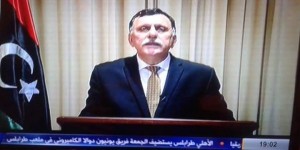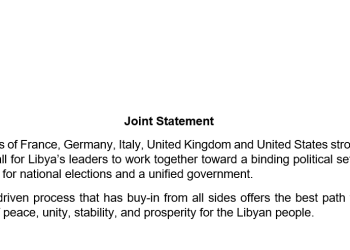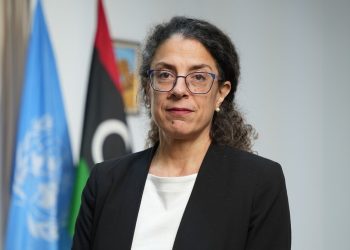By Sami Zaptia.

London, 30 December 2015:
The latest declaration of support by the social groupings of the city of Zawia yesterday follows . . .[restrict]an increasing number of declarations of support for the Prime Minister-designate Faiez Serraj’s Government of National Accord (GNA) and is making it increasingly difficult for what is now clearly looking like the minority dissenters in opposition to the GNA and the growing momentum in its support.
Yesterday, at a press conference, the General National Congress (GNC) announced its so-called ‘‘Libyan-Libyan’’ alternative political agreement coming 12 days after the UN-brokered Skhirat agreement was signed by a majority of Libyan political entities.
What was announced of the GNC proposal yesterday, lacked detail and the complexity of the UN-brokered Skhirat Libyan Political Agreement (LPA) that was thrashed out over a year.
It also lacked the depth and comprehensiveness of a detailed political agreement taking into account a myriad of Libyan political actors across tribes, regions and interests.
Moreover, with the GNC coalition unravelling since its formation in the summer of 2014 after the forceful occupation of Tripoli by Libya Dawn militias, including yesterday’s decision by its Government of National Salvation decision to censor Misrata Municipality Council , the GNC’s political-military coalition seems to be running out of its raison d’etre.
Yesterday, Libyan media was even quoting HoR boycotting member for Misrata, Fathi Basagha, saying that the Skhirat agreement enjoys large support amongst most Libyans.
Meanwhile, the UN-brokered LPA and its proposed GNA has received support from most Municipality councils except Tripoli, which it is believed to have withheld its public support as much in fear of militia intimidation as opposed to being in support of the opposition view.
The GNA has also received the support of HoR members for the east at a Cairo meeting with Faiez Serraj on 26th December.
It has further received conditional support from eastern-based tribes declared in the presence of dissenter and HoR president Ageela Salah – who is in favour of an alternative project to the UN-brokered LPA/GNA.
Derna Mujahidine Shura Council (DMSC) has also announced its tacit support on the condition that any government is based on the foundations of Islamic Sharia law.
The Amazigh Supreme Council (ASC) condemned the Skhirat outcomes for excluding it from its process, and said that because of this exclusion it could neither support nor oppose the LPA.
Tripoli’s militias, in the form of the Tripoli Revolutionaries’ Brigades, has announced that it is apolitical and will support a government of national unity.
The Misrata Elders’ Council set up by the GNC, and unlike Misrata’s Municipality Council and most of the city of Misrata, is one such body that has declared its support of the GNC and HoR minority-supported ‘’Libyan-Libyan’’ alternative to the GNA favoured by the two parliaments’ presidents Nuri Abusahmain and Ageela Salah.
What was notable yesterday, was that the alternative GNC option was announced by and at the GNC in Tripoli and accredited to the GNC Political Committee and not jointly with the Ageela Salah HoR minority members.
Moreover, no follow-up announcement of backing or support for the GNC proposal has come from the Ageela Salah dissenting minority in Tobruk.
This may suggest that the hastily formed Nuri Abu Sahmain-Ageela Salah alliance may have reached its limits based on thin foundations as it was.
Equally, with Hafter towing the UN-brokered LPA line and the eastern tribes – the bedrock of Ageela Salah’s political support in the east – coming out in favour of Skhirat, Salah has been left marooned politically.
Ultimately, the LPA and its GNA will succeed or fail – as did its predecessors – on its ability to gain traction on the ground and in Tripoli in particular.
If Faiez Serraj and his GNA is able to house itself safely and securely in the capital Tripoli and be able to have traction in its pronouncements on everyday life, it will have a realistic chance of success.
In other words, will the GNA be able in practice as is prescribed in its articles, to persuade one way or another, the various militias to vacate Tripoli and remain in barracks? Will it be able to persuade the militias to resist the temptation to use their coercive force emanating from the ends of the barrels of their guns to extract their militia and personal gains?
Will the GNA be able to actually rule within, first Tripoli, and then the other major cities? Will it enjoy some kind of monopoly on the legitimate use of force within the capital long enough in the short term to establish and entrench its legitimacy?
All the GNA ‘s predecessors, the governments of Mahmoud Jibril, Abdelrahman Kib, Ali Zeidan and Abdullah Thinni lacked enforceability. They all lacked the ability to force Libyan civilians, and more importantly militias – to obey the rule of law and edicts of the legitimate legislatures and executives.
Ultimately, therefore, the success or failure of the LPA and its GNA will depend on the ”security arrangements” put in place by UNSMIL and its security advisor Lieutenant-General Paolo Serra. [/restrict]










